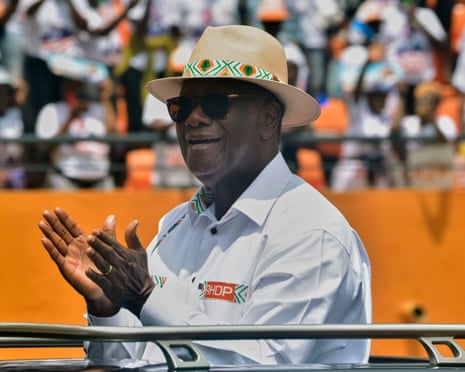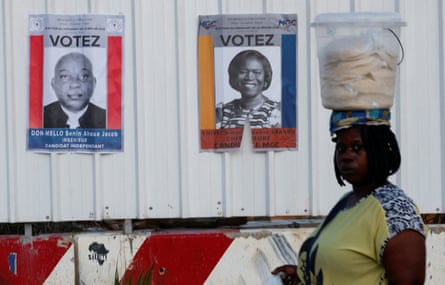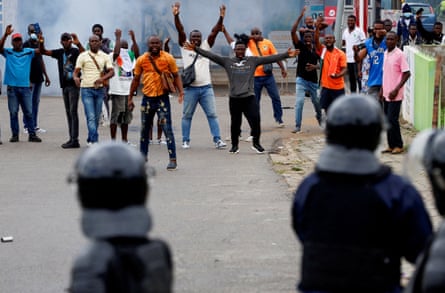
“This is worth several more terms,” the Ivorian president, Alassane Ouattara, joked while opening a bridge named after him in the country’s commercial capital, Abidjan, in 2023.
The appearance in recent years of several new bridges in west Africa’s second most populous city has been hailed by the president’s supporters as symbolic of an era of modernity and stable leadership under his watch.
Infrastructure building has ramped up around the country and the economy has grown rapidly since Ouattara first took office in 2011 – proof, his camp says, that decades of violent crises have been left in the past.
A sense of deja vu
On a Saturday earlier this month more than 200 protesters were teargassed and arrested across Abidjan, including in neighbourhoods within a mile of the bridge opened by Ouattara two years earlier.
It was the latest in a series of demonstrations by young people against Ouattara’s decision to run for a fourth term in the presidential election taking place on 25 October.
All protests have now been banned by the government.
In another sign of a crackdown on free speech and dissenting voices, leaders of two opposition parties alleged that security personnel ransacked their homes this month, without a search warrant.
“These elections can be won without bloodshed,” said the main opposition candidate, Simone Ehivet Gbagbo. Gbagbo, Ivory Coast’s first lady from 2000 to 2011 when she was married to the former president Laurent Gbagbo, was once known to her supporters as “the Hillary Clinton of the tropics”. Others gave her the nickname “the iron lady” due to her tough reputation.
“The right solution is not to march or boycott,” she said. “The right solution is to vote.”

For older citizens, there is a sense of deja vu: Ouattara, 83, is almost the same age as his mentor Félix Houphouët-Boigny – the country’s first president – was when an uprising in 1990 led to the country’s first multiparty elections.
In July, he confirmed what people everywhere from roadside maquis (open-air restaurants) to diplomatic dinners had suspected: he was standing for yet another term. In 2020 he reached the same decision, initially declining to run for a third term but changing his mind when his party’s designated candidate died during the coronavirus pandemic, claiming that a 2016 constitutional amendment had reset the clock. The main opposition boycotted the vote and Ouattara won a controversial victory.
More controversy beckons when the country goes to the polls on Saturday.
Two leading opposition figures have been sidelined. Laurent Gbagbo, now 80, is entangled in a past legal conviction linked to the 2010-11 post-electoral conflict. The former Credit Suisse banker Tidjane Thiam, 63, was disqualified after a court ruled he was a French national when he registered to contest, in contravention of Ivorian laws.
Ouattara will face an array of lesser-heralded contenders including Simone Gbagbo and three former ministers.
There are rumours about his health and claims that some of the elite – used to the trappings of power – are encouraging him to stay on. Nevertheless some supporters have called on him to step down to make way for a new generation.
In June, the front-page headline in the weekly Le Sursaut carried a plea from a self-described “allassaniste”: “Dear Papa Ouattara, don’t be a candidate.”
The communication minister, Amadou Coulibaly, brushed off any criticism. “The president is exercising his legal right under the constitution,” he told the Guardian. “He meets all criteria. Citizens are free to vote for or against him. That is democracy.”
Disinformation and disenfranchisement
Officials claim the nationwide infrastructure drive, including a rural electrification programme, has transformed many parts of the country and raised the standard of living.
“This government is committed to fighting poverty,” said Coulibaly. “In 2011, the poverty rate was 55%. In 2024, it dropped to 37%. Our goal for 2030 is to halve that again to around 18%.”
after newsletter promotion
However, the cost of living has soared, especially in Abidjan, inequality levels remain high, and the average life expectancy is only 59.
“A beautiful Ivory Coast with roads is good, but happy Ivorians are better … Ivorians are not happy,” Simone Gbagbo said after a rally in the central city of Gagnoa. “It is important that if we do politics, it is for the people.”
While Ouattara remains a beloved figure in the north and parts of the centre, his approval ratings have plummeted in Abidjan. France, te former colonial ruler, has become public enemy No 1 in the region, and Ouattara, like his Nigerian counterpart, Bola Tinubu, is seen as a Parisian puppet and adversary of the newly formed Alliance of Sahel States.

That perception has been fuelled by a deluge of disinformation, including fake rumours of a coup d’etat earlier this year, that analysts say fits a pattern.
“Most of the campaigns, most of the fake news we’ve observed, come mainly from Burkina Faso,” said Vanessa Manessong, a data analyst at Code4Africa and the African Digital Democracy Observatory. She said the accounts were often pro-Russia and anti-France, and sought to discredit France and sabotage its relations with Ivory Coast.
Ouattara’s popularity dipped more after the treatment of Thiam, who leads a party founded by his great-uncle, Houphouët-Boigny. Thiam’s disqualification is seen as continuing the exclusionary identity politics that has plagued Ivory Coast for decades and was a major factor in the civil wars of 2002 to 2007 and 2010-11.
A tense situation
Ahead of the election, things are tense: more than 44,000 security personnel have been deployed nationwide. Diplomats and some expatriates are sending their families abroad briefly.
In October last year, the influential Student Federation of Ivory Coast, which has allegedly been involved in organised crime since it was established during the 1990 uprisings, was banned after two student murders and caches of weapons were found. There are fears that the group’s many factions could intervene to support their preferred candidates.
Ouattara’s rivals have called for daily protests, hoping for an audit of the electoral register and reinstatement of their leaders.

Coulibaly dismissed concerns of possible voter apathy if the disbarred candidates were not reinserted. “It’s everywhere in the world that people are losing interest in elections … so I don’t want people to stigmatise our continent,” he said. “There’s a global kind of democratic fatigue.”
On a recent trip across one of Abidjan’s new bridges, Kouakou, a taxi driver who asked for his last name not to be used, said he was glad his compatriots were taking to the streets, but that he had resigned himself to another Ouattara victory.
“It’s like an episode of 24,” said Kouakou. “You know Jack Bauer will win but you don’t know what happens before then.”